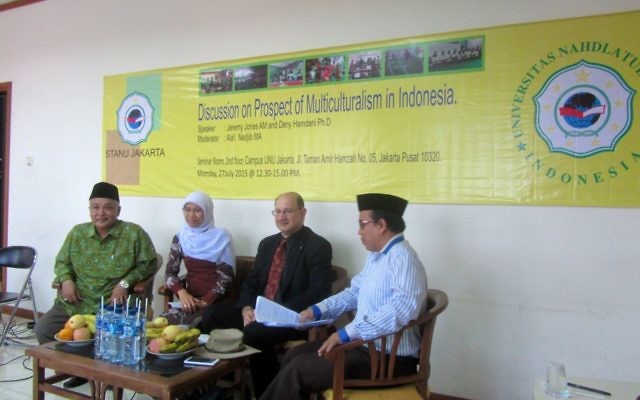Jones makes interfaith history
THE Australia/Israel & Jewish Affairs Council’s (AIJAC) Jeremy Jones says being hosted by Nahdlatul Ulama (NU) – one of the world’s largest Muslim organisations in terms of membership – in Jombang, Indonesia recently was “a historic breakthrough in Jewish–Muslim relations”.
THE Australia/Israel & Jewish Affairs Council’s (AIJAC) Jeremy Jones says being hosted by Nahdlatul Ulama (NU) – one of the world’s largest Muslim organisations in terms of membership – in Jombang, Indonesia recently was “a historic breakthrough in Jewish–Muslim relations”.
Jones, AIJAC’s director of international and community affairs, was a guest of the Organising Committee of the 33rd Muktamar (summit) of NU – where elected delegates from around the country met for the first time since 2010 – and was introduced as a friend of NU and a pioneer in Jewish–Muslim dialogue.
The summit was addressed by Indonesia’s President Joko Widodo. Other official guests included a former Indonesian president and serving parliamentarians, diplomats and Islamic scholars from Egypt and Saudi Arabia.
Prior to the summit, Jones embarked on a speaking tour in Indonesia organised by the NU members who had participated in AIJAC’s Muslim-Jewish dialogue which took place in Israel in January.
Jones said some of the highlights of the visit included speaking at an international symposium on religion and peace attended by more than 600 scholars and students; participating in a panel discussion at the University of Indonesia on religion and Middle East conflicts that was attended by foreign affairs officials, academics and activists in Islamic organisations; and conducting a round-table discussion on Judaism and dialogue hosted by the Sharia law faculty at the State Islamic University at Semarang.
“In the audiences of mainly religious Muslims, there was enormous interest in Jewish prayer, the contrasts between the Torah and the Koran, the sources of Jewish wisdom and foundations of Jewish law,” Jones said.
“There was respect, curiosity and a stream of intelligent questions, many of which presented me with the opportunity to correct misconceptions. The feedback was phenomenal.”
He said that when the discussions had a focus on the Middle East, it was “often apparent that much of the anti-Israel antagonism was the result of ignorance rather than malice, and shaped by the media rather than by ideology”.
Other highlights included being presented with the prayer hat of a Koran reciter at a university symposium, who said that he was “happy and surprised to be so inspired by the first Jewish person he had encountered”; a three-minute ovation when Jones demonstrated laying tefillin to a large group of students; and being thanked by senior academics for “removing false conceptions” concerning Jews.
AJN STAFF


comments